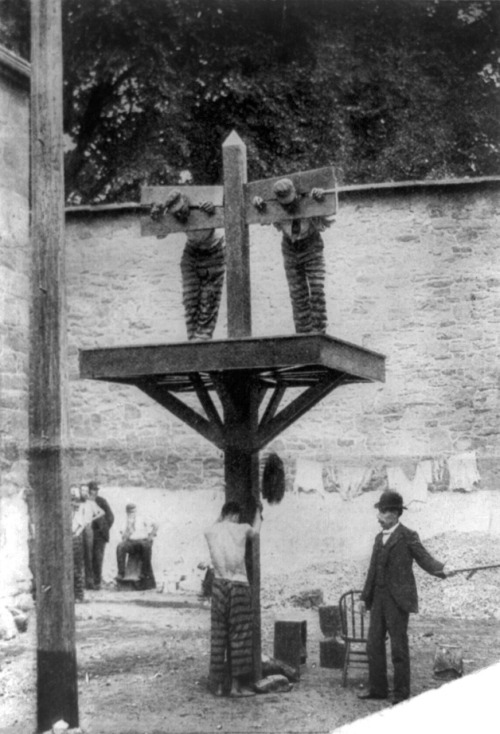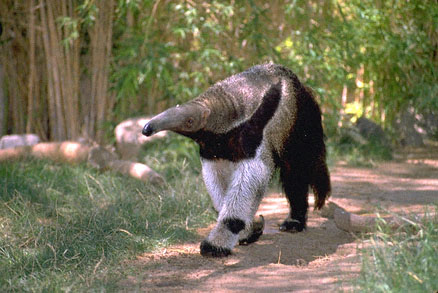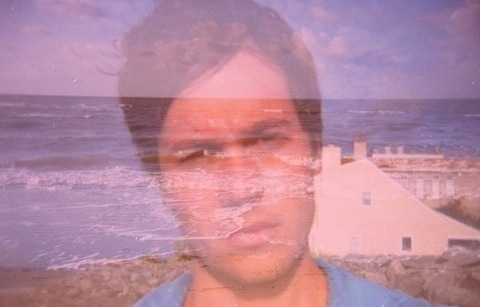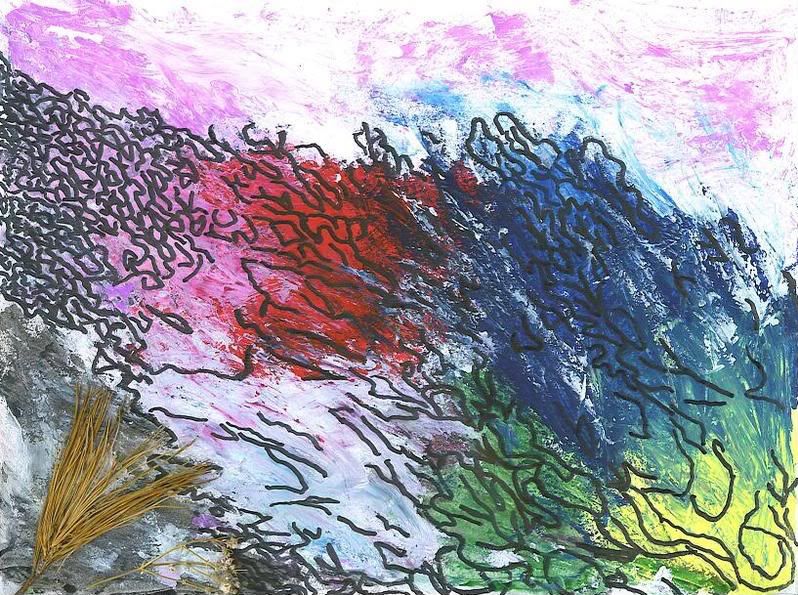Grizzly Bear- Veckatimest
By Josh Ginsberg
As I write this, in a sticky basement, I am in the midst of an unusually warm April and Veckatimest is slated for release on May 26th. What I’ve been listening to is the “low quality leak” that turned up in a sendspace link on a friend’s facebook status in early March. Veckatimest is named for a small island in Dukes County, Massachusetts that I have never visited. I cannot liken the waves of effervescent, vintage American pop that Grizzly Bear condensed into the four minute bliss of “Two Weeks” to a picnic on that island’s shores. I cannot compare Daniel Rossen and Ed Droste’s elaborate guitar playing to the dense tree line, which weaves meticulously, creating an almost psychedelic aerial view or that guitar sound/forest’s impenetrability, dense unyielding space with only slight crevices left to slide deeper into. I cannot compare “Dory,” from experience, to the clear, foamy, creek that cracks through the foliage of the forest floor, lined with flat, slate-grey stones. Nor can I liken the reflection of closer “Foreground” to the view from the beach at night, at the flickering lights of some small, quaint harbor on the Massachusetts mainland. But those are the images inseparable to me from Veckatimest’s sounds.
Grizzly Bear crafted a stellar album. Bassist/Clarinetist/Flautist/Producer/Arranger Chris Taylor mixes the songs flawlessly. His bass guitar playing is excellent, and his sound manipulation, which is exemplified best on the instrumental potions before the second verse of “Fine For Now” is shimmering and enchanting. The most fascinating thing that Taylor accomplishes is the creation of a heavenly, ethereal arrangement, which the orchestral and chorale arrangements augment. He arranges strings beautifully and subtly on “About Face” and they never sound superfluous or forced. The quintessential example of his aplomb as an arranger and composer can be spotted on “I Live With You,” which begins with Taylor’s signature woodwinds, and a harp, before a low section of strings cuts in and the song gives way to a women’s choir, who can be heard laughing and talking to one another if you listen closely enough to the parts where they drop out. Chris Taylor is a peer to Van Dyke Parks or George Martin if I’ve ever heard one.
One of Taylor’s most essential contributions to the band is his innate ability to balance the different singing voices of the members, particularly the two lead vocalists, the lush, soothing, snow-capped vocals of Ed Droste and the quivering voiced Daniel Rossen, who seems capable of necromancy at his most sinister moments. The two men sing together on most songs, and while it is easy to peg a song like “Fine For Now” a Daniel Rossen song, because he sings the lyrics, the song wouldn’t be the same listening experience if not for the sheets of Ed Droste’s harmonies. While Rossen sings the lead vocal on the pre-chorus of “Fine For Now” it is Droste’s soaring backing vocals that steal the show. Rossen and Droste don’t harmonize like the Dead, Beach Boys or CSNY. Their harmonies are more evocative of the infrequent but perfectly complimentary harmonies of Thom Yorke and Ed O’Brien or the duel lead vocals of Avey Tare and Panda Bear; both voices are distinct melodic entities more than harmonic ones. After a chorus punctuated by a guitar part that is sublime in a sense that is strictly in tune with Edmund Burke’s conception of it.
The guitar is evocative of harrowing cliffs and mountains that taper endlessly, piercing the holiness of whatever heavens may lie above, Droste vocalizes a passage that may have been played out on the electric guitar by a different band, but Grizzly Bear display their immaculate ability to sing. “Two Weeks” is led by Droste, who sings the simple, plaintive lyrics. But the strongest hook on the entire album is the three-way harmony between Rossen, Taylor and drummer Christopher Bear, that is sung between Droste’s lines.
Songs like “All We Ask” find Rossen and Droste switching off between verses and choruses, with Rossen singing the swinging, “faltering,” chorus, evocative of jazz-age cities, streets crowded with taxis, sidewalks swarming with neatly dressed pedestrians, straight off the page of some F. Scott Fitzgerald story, as a choir of Drostes sigh forlornly. The song’s bridge, on which a pew of Grizzly Bears, most prominently Droste, laments as the song draws to a close, “I can’t get out of what I’m into with you.” Droste and Rossen also sing excellently without each other’s help. Rossen’s vocal melodies are some of the best on the album, especially his fierce, tormenting vocal on the chorus of “Southern Point,” which manages to sound like Armageddon while being entirely void of melodrama. His next best solo performance occurs during the vocal passages when he is not pitted against the women’s choir on “I Live With You,” which shows his ability to let his vocals soar, a hard thing to prove yourself worthy of for someone who sings co-lead vocals in a band with Ed Droste. It is strange to think back to the days before Rossen joined the band, as he is every bit as essential as Droste, and contributes an incredible amount to the band with his guitar work and songwriting.
On Veckatimest the acoustic guitar is still featured prominently, such as on songs like “Southern Point,” or “Dory” or “Hold Still.” However, on most of the album, it is the electric guitar that is more prominent. The electric guitars evoke the raw, dry volume of pre-1975 Neil Young, but they are dampened with reverb and frayed with short delay. Passages like the climactic point on “Fine For Now” pop up on many of the album’s songs, including the should-be single, “While You Wait For the Others.” That tone echoes late sixties Americana while still sounding at home amongst the guitar work of bands like Animal Collective, Deerhunter and Abe Vigoda. The extended instrumental intro of “All We Ask,” cloaks the picking of Yellow House in the same tone used on Friend EP tracks like “He Hit Me.” One of the best guitar moments on the album is one of the most ambiguous. The little, bursts of reverb moistened guitar that bloom like sonorant cactus flowers on “Ready, Able” almost sound like a sample, because of how quickly they blossom from non-entities to flourishes to nothing again. This is another instance in which beautiful short delay is employed.
Veckatimest also boasts an incredible keyboard sound. The keys that open “Two Weeks” sound more like a sunny, Kentucky garden or stretch of hills than any Lynard Skynard riff ever could. The high-end electric keyboard arpeggios of the songs chorus bore tiny little wasp nests into the listeners’ subconscious, and remain rooted there until re-listened to.
The most impressive sound on the album is the drum sound, which is produced immaculately. Christopher Bear plays beats that heavily utilize toms, but unlike the taut tom sound of seventies rock or the loose sound of tribal music. His percussion is mixed almost subliminally. Where another drummer might pump up a song with a driving, two armed assault on a snare drum, Bear achieves that same dynamic before the chorus of “Southern Point,” with nothing more than cymbal wash. His driving beat through the chorus mixes a snare pattern that could’ve been pattered out by a soldier marching through the wintry woods of 1778, and plays a fill that is more akin to Jamaican music or Metal than the “indie rock” it will lumped together with. The album’s most noteworthy drum pattern is the beat of “Two Weeks.” “Two Weeks” only hardly suggests the odd, syncopated beat that carries it, while riding its waves the entirety of the song. The beat is based around the rims of snares and his swiftly pinched high-hat. It might be the last thing the average listener would point out, but it’s one of the first things that hits. Christopher Bear’s jazz training is especially apparent on the end of the song. While Ed Droste manipulates some strange device that creates bright, melodic oscillations, pitted against what sounds like a tremolo-drenched electric guitar, Bear assaults with bells of his ride cymbal with more finesse than any of the jazz greats of the bop era. Not once does
Christopher Bear surrender his distinct style for a bland rock beat.
The songs on Veckatimest are more or less all top notch. Veckatimest features songs that are all memorable and that don’t bleed into each other as the songs on Yellow House sometimes did. The album is brighter, although, minor key melancholia is evoked at some point throughout at least half the songs, such as on the chorus of “Ready, Able,” the verse of “Fine For Now,” or the late-night-side-of-the-highway piano lines of “Foreground.” The only shortcoming of the songs is the occasional lyrical dud. The Grizzly Bear guys aren’t really elaborate wordsmiths. They aren’t bad lyricists per se, but they offer quatrains of seemingly meaningless, sometimes prosaic ramblings or non-sequiturs, best exemplified in the chorus of “Two Weeks,” which reads “Would you always / Make it easy / Maybe sometimes / Take your time.” Ed Droste isn’t exactly saying something poignant and if his execution is something shy of adroit, but that doesn’t detract from the song’s merit. I thought the lyrics of the verse (“Save up all the days / A routine malaise / Just like yesterday / I told you I would stay”) were good until I read them on paper and realized they were sort of juvenile and disjointed. Grizzly Bear are simply not a lyrics band. The best lyrics on the album are probably those on “Dory” which opens, “Oh wildly cohering in a watery deep….”
Veckatimest is the first truly consistent album of Grizzly Bear’s career. Yellow House is a much “cooler” album, but where Yellow House creates a distinct and fascinating horizon of sound that melds pre-War Americana, pastoral woodwinds and the fiercest acoustic finger picking and guitar webbing this side of John Fahey, Veckatimest offers twelve hooky and neat songs. Song albums are never as “cool” as album-albums, where a really cohesive and distinct mood is created and explored until the breaking point but they’re a lot more enjoyable to listen to. Grizzly Bear have released a greatest hits worth of great songs between their debut Horn of Plenty in 2005 and their Friend EP in 2007, but never before have they crafted an album as great as Veckatimest.
















.jpg)























